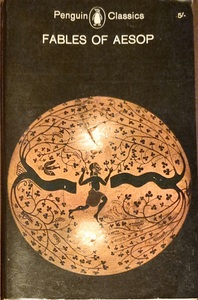Take a photo of a barcode or cover
Beautifully illustrated and a wonderful edition of Aesop's Fables. Not all of them have moral to the story and some feel too modern to be attributed to Aesop but none the less I enjoyed the edition.
fast-paced
reflective
slow-paced
The best stories in the collection are ones you are probably already familiar with; 'The Boy Who Cried Wolf', & 'The Hen Who Laid The Golden Egg' (Yes, apparently it was a hen & not a goose, according to this translation). In most of the stories the animals speak & think like humans, & specific animals are consistently used to represent specific types of people. The lion is a tyrant, the wolf is a predatory psychopath, the fox is a con-artist, the snake is a betrayer, the owl is wise, & the ass is, well, an ass.
Using animals to tell unusual, moral tales never loses its appeal. These short stories are fun to pick up and put down, to enjoy slowly like a cooling cup of coffee over the course of a long winter's morning. Would highly recommend slow consumption ;-)
Long story short? I didn’t enjoy this at all…
While I recognize its significance in literary history and moral education, the collection felt overly didactic, repetitive, and lacking in nuance. Many of the fables offered rigid, black-and-white lessons with little context—and at times, the morals even contradicted one another. The stories themselves often felt one-dimensional, with scenarios that were either far-fetched or too simplistic to carry any real weight.
I found myself bored more often than not, and I rarely agreed with the messages being presented. The pacing was quick and the format made it easy to get through, which was a positive – but not enough to redeem the overall reading experience. I also found the animal names to be quite unfamiliar at times, which disrupted the flow and had me pausing to look them up.
Compared to other collections like Grimm’s Fairy Tales, which felt darker, richer, and more layered, Aesop’s Fables came across as dry and too moralistic for my taste.
That said, one fable did stand out to me: The Mice in Council which goes as follows…
Once upon a time all the mice met together in council, to discuss the best means of securing themselves against the attacks of the cat. After several suggestions had been debated, a mouse of some standing and experience said, “I think I have hit upon a plan which will ensure our safety in the future: let us fasten a bell around the neck of our enemy the cat, which will by its tinkling warn us of her approach.”
This proposal was warmly applauded, and it had been already decided to adopt it, when an old mouse, with a wise head, got up and said, “That is all very well, but who is to bell the cat?”
The mice looked at one another and nobody spoke. Then the old mouse said: “It is easy to propose impossible remedies.
Simple, clever, and still relevant. It stuck with me far more than all of the others. A quiet reminder that bold ideas are one thing – but the real challenge lies in carrying them out.
I didn't like how there was a moral given after every story. Some times if not most I had a different interpretation
3.5 stars. The illustrations and layout are great, and as someone who has studied Greek and Roman literature, it was interesting to read the original Aesop's fables which so obviously reflect the prominent values in the culture at the time. Unfortunately, the editors have chosen to follow each fable with the moral they took from it, which seem sometimes arbitrary or even worse contrary to the moral as I saw it. I really enjoyed reading the fables but wish the editors had perhaps triple-checked, proof-read or rethought some of their conclusions, or eliminated them altogether.
My mom used to read this to me when I was a kid.
hic rhodus, hic salta
single reversal
The wolf and the lamb: "Well anyhow, I'm not going without my dinner."
double reversal
The wolf, the mother, and her child: "As for the people in that house, you can't believe a word they say"
The wolf and the boy: If you can say three things to me, the truth of which cannot be disputed, I will spare your life."
massive cope
The lion, the mouse, and the fox: "Afraid of a mouse? Not I! It's his bad manners I can't stand."
classic joke
The sick man and the doctor: "I'm dying of good signs."
single reversal
The wolf and the lamb: "Well anyhow, I'm not going without my dinner."
double reversal
The wolf, the mother, and her child: "As for the people in that house, you can't believe a word they say"
The wolf and the boy: If you can say three things to me, the truth of which cannot be disputed, I will spare your life."
massive cope
The lion, the mouse, and the fox: "Afraid of a mouse? Not I! It's his bad manners I can't stand."
classic joke
The sick man and the doctor: "I'm dying of good signs."




